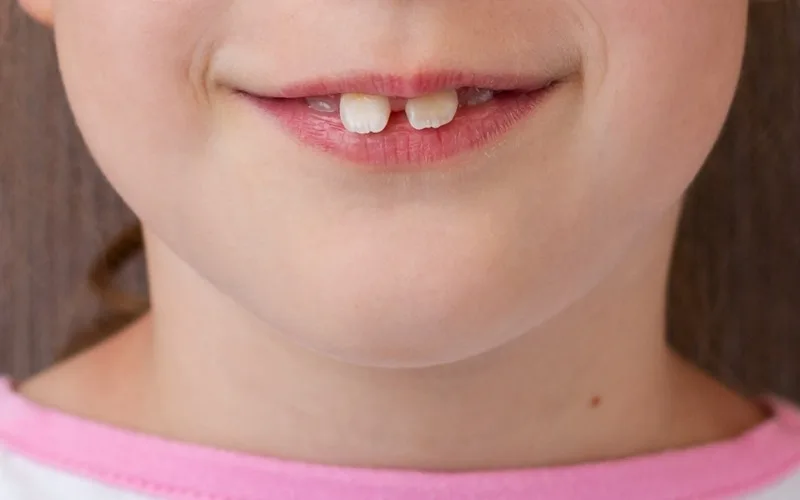How to Get Rid of Buck Teeth?

The problem of buck teeth is an issue that can disturb individuals both aesthetically and functionally, as it negatively impacts chewing. This condition, commonly seen in society, can now be resolved thanks to modern dentistry practices. It is possible to completely eliminate the this unwanted situation with various treatment options. However, understanding the problem thoroughly and determining the most suitable treatment for the patient is essential.
Many questions about buck teeth arise, and we will provide detailed answers here. Specifically, we will share information about treatment options and their costs. But first, let’s discuss the potential causes of this situation.
What Causes Buck Teeth?
Various factors can lead to buck teeth, some of which stem from childhood habits. Additionally, congenital or genetic factors may play a role in this problem. The main causes can be summarized as follows:
- One of the primary causes is thumb-sucking habits. If this habit, which typically starts in infancy, is not discouraged and continues for a long time, the upper teeth may be pushed forward, resulting in the buck teeth.
- Extended pacifier use is another common cause of buck teeth. This issue is frequently seen in babies who use pacifiers for prolonged periods, leading to misalignments between the upper and lower jaws.
- Improper feeding positions during breastfeeding or bottle-feeding can negatively affect dental alignment, potentially contributing to the development of buck teeth.
- Studies have shown that genetic factors can influence this condition. Individuals with a family history of buck teeth are more likely to develop the problem themselves.
- Large gaps or missing teeth can disrupt proper alignment and create a predisposition for buck teeth to appear.
Other less common, specific factors may also contribute to it, making a detailed dental examination essential for each case.
How Can Buck Teeth Be Corrected?
The primary question most people have is: How can buck teeth be corrected? This issue is not just about aesthetics but also dental functionality, as it can cause various complications. Several treatment options are available, including:
Braces (Orthodontic Treatment)
One of the most common treatments is orthodontic correction with braces. The main goal is to ensure proper alignment of the teeth, eliminating gaps and preventing the buck teeth. Braces can be especially effective when alignment issues are identified early. The duration of the treatment varies depending on the severity of the misalignment and the patient’s response to treatment.
Surgical Intervention
In some cases, surgical intervention may be necessary to correct buck teeth, especially if orthodontic treatment is delayed or insufficient. However, surgery is generally a last resort and is only recommended when deemed essential by a dentist.
Invisalign (Clear Aligners)
Clear aligners are a popular alternative for addressing alignment issues. These custom-made aligners are particularly appealing to those with aesthetic concerns, offering a discreet and removable solution. They provide convenience during meals and cleaning routines.
It’s worth noting that dental veneers, often associated with cosmetic corrections, are not effective in treating buck teeth but can help conceal minor misalignments.
When Should Surgery Be Considered for Buck Teeth?

The decision on whether surgery is needed for buck teeth will be determined by your dentist after examining the problem. A thorough review of the buck teeth is essential to determine the necessity of surgery. Additionally, the jaw structure of the patient should also be assessed. Below are some scenarios where surgery may be required due to buck teeth:
Severe Dental Anomalies
If the anomalies in the teeth are significant, treatment may only be possible through surgical intervention. Surgery might also be needed due to structural anomalies in the jaw. For some patients, correcting buck teeth and eliminating anomalies is only feasible through surgery.
Position and Structure of the Teeth
Structural issues related to the positioning of the teeth may also necessitate surgery. For instance, teeth that are unusually large, small, long, or short can be a reason for surgical intervention.
Resistance to Treatment
Surgery may be required if other treatments fail to achieve the desired results or if the teeth resist treatment.
Cases Where Surgery May Not Be Necessary
Here is a brief list of situations where surgery may not be required:
- Minor issues that can be corrected with other treatments
- Cosmetic corrections for aesthetic purposes
- Patient preference to avoid surgery
Cost and Duration of Buck Teeth Treatment
The cost of treatment varies depending on the chosen treatment method, the clinic, and the dentist’s expertise. Turkey has become a popular destination for dental treatments due to its affordability, offering costs 60-70% lower than in Western countries. Advanced technology and experienced dentists make Turkey an attractive option for international patients.
The duration of treatment depends on the severity of the problem and the patient’s response. Simple cases may be resolved in a few months, while more complex ones could take several years.
How Long Does It Take to Fix Buck Teeth?
The time required to fix this situation varies for each patient. This is because the treatments applied and the response to these treatments differ significantly among individuals. It is not possible to provide an exact duration, but your dentist can give you an approximate timeline. Particularly in severe cases, the treatment process takes longer, and more frequent check-ups may be necessary. However, in simpler cases, it is possible to achieve successful results within a shorter period.
The age of the patient and how their teeth respond to the treatment are also important factors affecting the duration. To give a general idea, this treatment process may take just a few months or, in some cases, several years. Your dentist can provide you with a more specific time estimate before the treatment begins.
Can Buck Teeth Be Fixed at Home?
It is not possible to fix it at home. This correction must be carried out by dentists using the proper treatment methods. However, you can take some preventative measures at home. The most important of these is paying attention to oral hygiene. Brushing your teeth daily and cleaning between your teeth with dental floss can help prevent various oral and dental problems. For children, habits such as thumb sucking or excessive use of pacifiers should be discouraged. You may also consider seeking professional assistance for this.
Are Buck Teeth and Protruding Teeth the Same?
No, buck teeth and protruding teeth are not the same. Buck teeth refer to the front two upper teeth being noticeably larger and longer than the other teeth. The difference is often quite distinct. Protruding teeth, on the other hand, occur when the upper front teeth stick out forward. This issue is often caused by structural problems in the jaw. Although these two conditions may appear similar, they are actually very different problems.
Do Pacifiers Cause Buck Teeth?
Yes, prolonged use of pacifiers is one of the causes of this situation. However, this does not mean that every baby who uses a pacifier will develop this problem. It is more likely to occur if pacifiers are used excessively or for an extended period during the day. The reason lies in the overuse of pacifiers, which can lead to misalignments between the upper and lower jaws.
It may interest you –> Antalya Dental Clinic
Does Thumb Sucking Cause Buck Teeth?
Yes, thumb-sucking habits in children are another cause of this situation. When this habit persists during early childhood or infancy, it gradually pushes the upper teeth forward. As a result, buck teeth can develop over time.
Does Mouth Breathing Cause Buck Teeth?
Yes, habitual mouth breathing in children can also lead to the upper front teeth extending forward, leading to this problem. Additionally, mouth breathing can cause various other problems related to facial development.
You can check it out –> Dental Care Istanbul
Are Buck Teeth a Birth Defect?
No, they are are not considered a birth defect. While genetic factors may play a role in determining this dental appearance, it is not caused by a condition present at birth. Therefore, it cannot be classified as a birth defect.
Is It Normal to Develop Buck Teeth After Dental Prosthetics?
No, buck teeth do not develop as a result of dental prosthetics. Such an outcome is not possible. Although poorly designed prosthetics may cause some issues, they do not result in growth or elongation of the upper front teeth.
For your information –> Zirconia Crown
